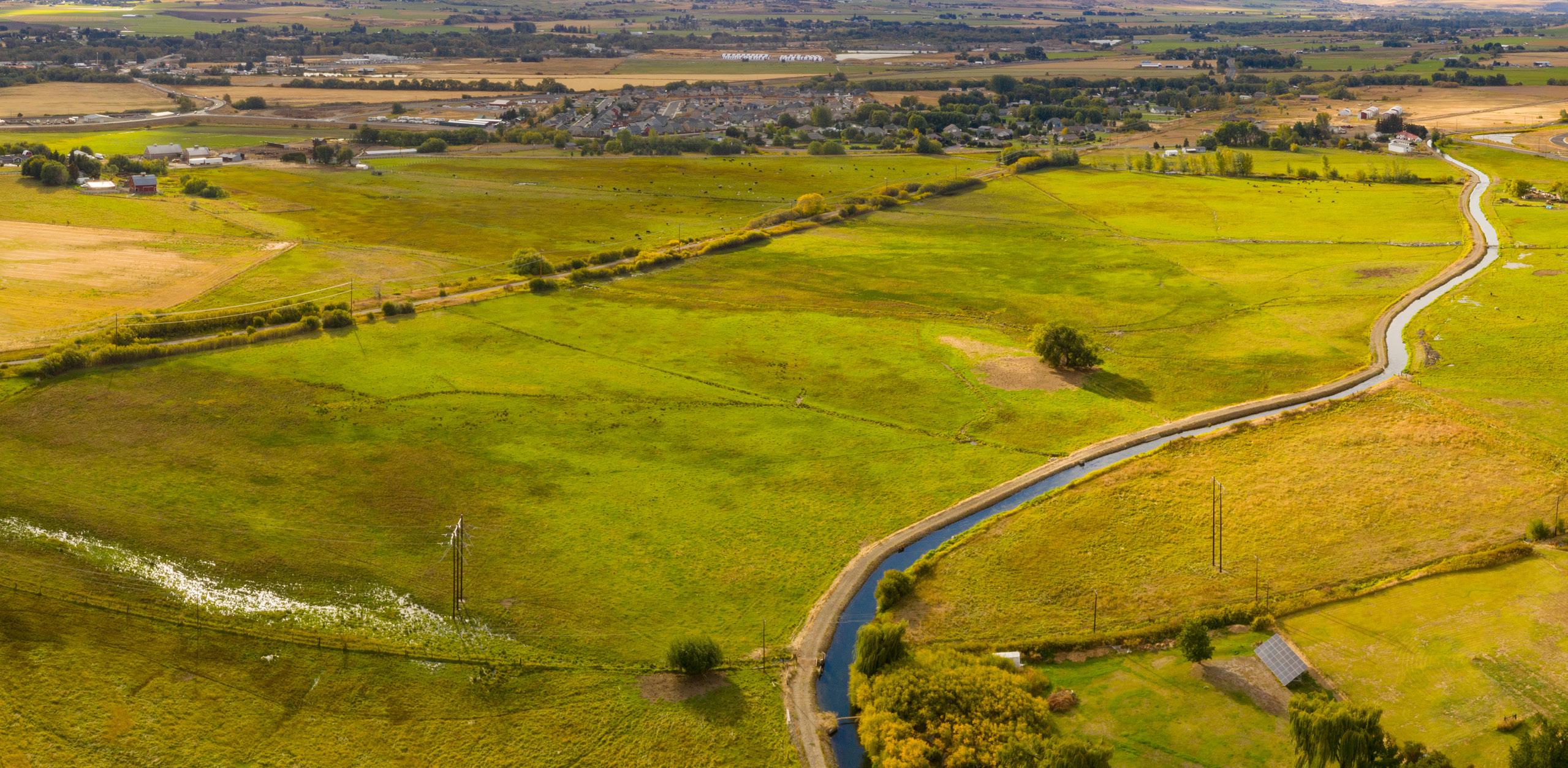
6 minute read
Navigating Water Rights Due Diligence When Acquiring Real Estate
by Kendall Burgemeister, Law of the Rockies
During the 2023 National Land Conference, I had the opportunity to discuss the process of performing due diligence on water rights while acquiring real estate. This kind of investigation usually involves examining record title, off-record title, legal matters, historical usage, and the physical condition of the water. This article provides a brief overview of each of these areas and gives examples to illustrate them. Moreover, it delves deeper into the two topics that raised the most questions after my presentation at Conference: adverse possession and use limitations in the governing documents of water companies.
Record Titles
“Record” title matters refer to matters reflected in the real property records of the county where the property is located. In Colorado— like many western states—the general rule is that water rights are conveyed like interests in real estate and are therefore subject to the states’ recording statute. Water rights purchasers are bound by previously recorded conveyances and encumbrances, regardless of whether they have actual knowledge of such matters.
The standard title insurance policy for real estate excludes water rights from the covered property, and a separate policy for the water rights is generally not available. Additionally, sellers will usually offer very limited or no title warranties when conveying water rights. Therefore, if a title defect is not discovered until after closing, the buyer is usually left without recourse. Like severed mineral interests, if a person desires to understand the ownership of a water right, a separate title search is required.
The record title review can be complicated for a host of reasons, including deeds for land that are silent as to water rights, but which may (or may not) convey water rights implicitly as an appurtenance, and vague deeds that simply convey a grantor’s “proportionate share” of a water right without providing any specificity on what that proportion might be. Both scenarios are common, and often leave the researcher in a position to offer little more than an educated opinion of how the ownership would most likely be resolved if a quiet title proceeding was completed.
In addition to verifying ownership of a water right, a record title review will also evaluate potential encumbrances on a water right, such as conservation easements or similar restrictive covenants, ditch maintenance agreements, and, of course, mortgages, deeds of trust, and other liens.
Off-Record Titles
Off-record title matters are generally defined as any rights that a third party might have in the subject property that are not shown in the real property records, such as unrecorded easements acquired through prescription. There are two specific types of off-record title matters— unrecorded ownership that has vested through adverse possession, and water company governing documents:
Adverse Possession of Water Rights
Most land professionals are probably familiar with the concept of adverse possession of land. The doctrine of adverse possession— sometimes referred to as “squatters rights”—vests ownership of land in a party that has occupied the land for a given period of time. While states have adopted widely varying criteria for establishment of title to land by adverse possession, I am not aware of any state that has abolished the doctrine altogether.
The same cannot be said regarding adverse possession of water rights. In fact, most western states have abolished the doctrine of adverse possession of water rights. Some states, such as Kansas and Wyoming, have prohibited adverse possession by statute. Others have rejected it through developments in common law. For example, in 2003, the New Mexico Court of Appeals held that water rights cannot be acquired by adverse possession. The logic of the court was, essentially, that water rights are subject to abandonment for non-use. Therefore, if a water right is being used by someone other than the true owner for an extended period, it was necessarily not being used by the true owner for an extended period of time, and the proper result is abandonment of the right altogether, not adverse possession by the user.
Continuous use is not 24/7/365 use. It is merely use in a manner
In Colorado, vested water rights (except those held by governmental entities) can be adversely possessed through 18 years of use that is continuous, open, and notorious, exclusive, adverse, and hostile to the true owner, and under a claim of right. For claims accruing after July 1, 2008, the claimant must have a reasonable, good faith belief that they were the actual owner of the water right to begin with. “Continuous” use is not 24/7/365 use. It is merely use in a manner consistent with a claim of ownership. Non-use outside the irrigation season or when the right is out of priority will not destroy an adverse possession claim. “Open and notorious” use is use that puts the true owner on reasonable notice—sneaking water in the middle of the night should not establish an adverse possession claim. “Adverse and hostile” use is generally use that is without consent (such as a lease or verbal permission) of the true owner.
Colorado only recognizes adverse possession “behind the headgate,” and it does not recognize adverse possession “against the stream.” This means that a water right must first be diverted at its lawful point of diversion before it can be adversely possessed. A person cannot dig a new ditch upstream and later claim to have adversely possessed the water right of a historical downstream ditch.
When investigating the historical use and physical condition matters of the subject water right (as discussed below), it is important to look for signs that any part of the subject water right has been used off of the subject property, and if so, review the situation more closely for potential claims of adverse possession (in states that recognize the doctrine) or abandonment (in states that do not).
Ditch Company Records
In Colorado, when a single water right serves properties owned by multiple parties, it is common for the water rights and infrastructure to be owned and operated by a company, such as a mutual ditch company. The individual property owners right to use water is represented by shares of stock in the company. It is common for such companies to adopt regulations regarding the use of water delivered through its systems, and to restrict the stockholders’ ability to change the point of diversion, place of use, and type of use of the water right. Therefore, reviewing water company records is critical, particularly when your clients intend to change some aspect of the water right (for example, a change from irrigation use to domestic use). While the ability to change a water right is recognized as part of the “bundle of sticks” of a water right, private agreements to restrict such changes— such as those contained in water company regulations, will also be enforced.
Legal Matters
Legal matters include everything from the permits and decrees applicable to the specific water rights at issue, to the statutes, common law, regulations, and administrative policies governing the administration of water rights in the state. An experienced advisor will look for any ways that the subject water rights are not being administered in accordance with current law and will also have insight into potential near-term changes in the law. Either scenario could portend future changes in the use of the subject water rights that could potentially have significant consequences for the value of the subject real estate.
Historical Use
Historical use analysis usually involves a review of state records (including diversion records), discussion with former owners and operators, and review of aerial imagery. The threshold inquiry into the historical use of a water right is to ensure that it has not been abandoned. Unlike interests in land, interests in water can be abandoned due to non-use. An extended period of non-use should give pause to any prospective purchaser.
Additionally, in Colorado and many other prior-appropriation states, the true measure of a vested water right is determined by its actual, lawful, historical use, which may be significantly less than the flow rate or volume in the decree or permit that initially established the right. The idea of purchasing a property and creating value by reselling its “surplus water” is most often illusory.
Physical Condition
Inspection of the physical condition of the water-related infrastructure will not only give a prospective purchaser an indication of repair expenses that may be incurred down the road, as mentioned above, it will also alert the buyer to potential risk of losing the water right altogether through either abandonment or adverse possession. A siphon tube running from a ditch to a parcel owned by a party with no ownership interest in the ditch—for example—would be a red flag.
Conclusion
With a basic understanding of the issues that are analyzed in a typical water rights due diligence investigation, you can assist your client in issue-spotting potential problems with listed properties and advise them when it might be prudent to retain a water rights professional to conduct a thorough due diligence analysis. As the example of adverse possession demonstrates, the law can vary greatly across jurisdictions. Please always consult with a professional with significant experience in the jurisdiction where the transaction you are involved in is taking place.
Kendall Burgemeister is an attorney based in Gunnison, Colorado, specializing in water rights and real estate transactions and litigation. Kendall serves as counsel to water conservancy districts, water and sanitation districts, and other water providers. Kendall also represents public and private clients in real estate purchases, sales, leasing, and development.






















